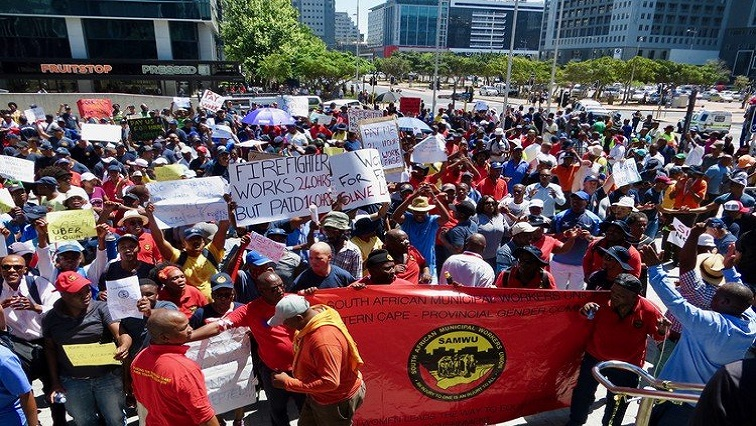News
Samwu Fires Back at DA as Tshwane’s Wage Battle Reaches Boiling Point

Samwu and DA Brace for a Tshwane Showdown Over Delayed Wage Increases
Union slams DA’s “anti-worker propaganda” as political and financial tensions intensify
The City of Tshwane is once again under the national spotlight and not for the reasons residents might hope. A long-running wage dispute has erupted into a full-blown political confrontation, with the South African Municipal Workers’ Union (Samwu) accusing the Democratic Alliance (DA) of deliberately misleading the public and undermining legally binding labour processes.
For thousands of municipal workers who have waited years for salary adjustments, the situation is no longer just a bureaucratic delay, it’s a breaking point.
A Bitter Fight Over a 3.5% Increase
The immediate trigger for the clash is the SA Local Government Bargaining Council’s (SALGBC) ruling ordering Tshwane to pay a 3.5% municipal salary increase, backdated to 2021.
Instead of welcoming the outcome, the DA has branded the ruling “legally flawed” and “financially ruinous”, arguing that the city cannot afford to cough up what may total around R2 billion.
Samwu’s general secretary, Dumisane Magagula, was blunt in response: the DA’s position, he said, is nothing but “anti-worker propaganda” packaged as fiscal prudence.
To Magagula, the issue is simple a legally binding decision was made, and workers should be paid. He wants city manager Johann Mettler to ignore what he calls “legally illiterate advice” from the DA and proceed with the payments.
And if the city dares appeal?
“Samwu will respond with the full force of our legal and organisational power,” Magagula warned.
+DA Pushes Back: “We’re Protecting Residents and Workers”
DA mayoral candidate Cilliers Brink says the party isn’t anti-worker, it’s protecting Tshwane ratepayers from a financial implosion.
Brink is urging mayor Nasiphi Moya and her administration to review the salary ruling before the 14 December deadline, insisting that the costs could cripple the metro’s already fragile finances.
“There are compelling grounds for the city to dispute this obligation,” Brink said, warning that a cash-flow crisis may harm both the workforce and the city’s four million residents.
The DA maintains it is open to a negotiated settlement, but only one the city can afford a point that unions believe is simply a tactic to delay payment.
Behind the Scenes: Years of Delays and No Clear End in Sight
The dispute isn’t new. Tshwane has struggled with salary increases since 2021, citing budget constraints, political instability, and inconsistent leadership.
For workers, the 3.5% increase represents more than a number, it is a symbol of recognition, stability, and dignity in a city where service-delivery failures often trace back to demoralised or underpaid staff.
Mayor Moya confirmed that the SALGBC rejected Tshwane’s application for exemption, ordering up to R1.6 billion in back pay.
But the question remains: Where will the money come from?
Public Reaction: A City Divided
On social media, the public conversation mirrors the political tension:
-
Residents worry the wage increase will lead to higher rates or more budget cuts in essential services.
-
Workers express frustration, accusing the city of dragging its feet while expecting them to keep the city running.
-
Political commentators argue that the dispute reflects deeper governance issues that have plagued Tshwane for years.
There’s no consensus, only growing anxiety.
A Fresh Angle: What This Means for Ordinary Residents
While political parties trade barbs, residents are caught between economic pressures and service delivery expectations.
If Tshwane pays the backdated salaries, the money has to come from somewhere, likely budget reallocations, borrowing, or increases in tariffs.
If Tshwane refuses to pay and takes the ruling to court, the city faces:
-
Prolonged legal battles
-
Possible strikes or shutdowns
-
Further instability in service delivery
Either way, Tshwane households will feel the impact.
Where To From Here?
With the DA insisting on financial caution and Samwu insisting on labour justice, Tshwane stands at a crossroads.
Should the city protect its fragile finances or honour a binding wage agreement long overdue to workers who keep the capital functioning?
As the December deadline approaches, one thing is clear: this dispute is no longer just about numbers. It’s about political credibility, workers’ rights, and the future stability of South Africa’s administrative capital.
Tshwane residents, once again, are watching and waiting, hoping the fight in the council chambers doesn’t spill over into the streets.
{Source: The Citizen}
Follow Joburg ETC on Facebook, Twitter , TikTok and Instagram
For more News in Johannesburg, visit joburgetc.com



























